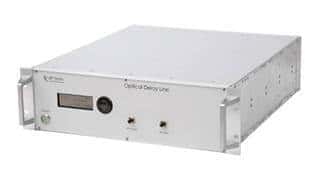Progressive Optical Delay Line
Chassis based highly customizable optical delay line solution. Its progressive architecture enables it to be programmed to form hundreds and even thousands of delays using fewer spools thus saving space. For example, an ODL solution that forms 32 delays between 1 to 32 microsec in 1 microsec steps fits into one 3U chassis.

Progressive ODL is also called variable ODL or programmable delay ODL since the delay it forms can be variable or programmed within a certain delay range
ODL design includes several considerations- Dispersion Compensation. Dispersion causes excess losses when designing a solution with longer delays at higher frequencies. Dispersion compensation has to be implemented as appropriate
- Optical and RF Link budgets have to be taken into consideration for longer delay ODLs as spools can cause excessive loss that may need to be compensated
Base Features
- Remote Ethernet based HTML/SNMP control (MIB is provided)
- Local Manual Control: LCD panel and multi-function push button to switch between delay display the delays in various formats
Optional Features
- Unity Gain: RF output power equals to RF input power level
- External Delay Option: Investment protection it allows connecting an external delay in the future
- Digital Attenuation: 30 dB attenuator with 0.5 dB steps to adjust the RF output level
- Fast Optical Switching: The standard switching between delay segments is 100 mile second. Switching time can be as low as 100 micro second. This feature comes with TTL control
- TTL control: Required when fast switching is needed
Customization
Based on customer needs and budget the ODL can be customized to provide
- Single delay solution
- Bidirectional Delay Line
- Multi Path Delay
Consultation
Our team has extensive experience in designing ODLs. Contact us to discuss your requirements and customize a solution based on your application and needs
Optical Delay Line solutions are used for testing and calibrating:
- Radars
- Altimeters
- Flight Simulators
- Any equipment that measures distance, altitudes
Some of the options are:
- Unity Gain
- Automatic Gain Control
- Dispersion Compensation
- Ability to add external delay line for future growth (Investment Protection)
- Fixed or Variable Delay
- Bypass
- Attenuator
